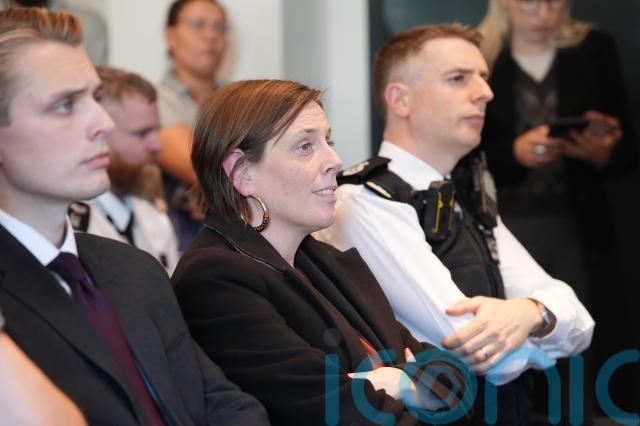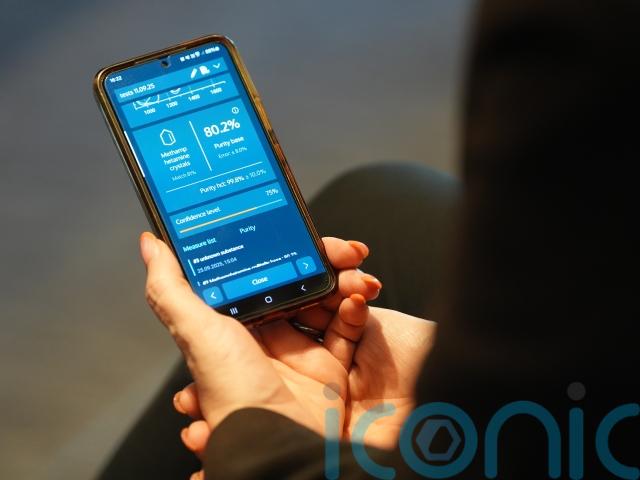
New vape-spiking detection equipment is being used in a crackdown across London, with operations spanning bars, clubs and party boats.
Children as young as 14 were admitted to hospital after cannabis products were placed in vapes in a case in south-east London, the Deputy Assistant Commissioner at the Metropolitan Police, Ben Russell, said.
The technology, which has been used in nightclubs, at festivals, concerts and schools, allows rapid testing of vapes suspected to contain drugs such as THC or spice, the Met said.
It is a growing concern for police after reports of vapes being tampered with, often shared between young people or handed out in social settings, the force added.
The Met is also using a range of mobile drug-testing equipment which assist rapid drug identification – including near infra-red detectors that can test powders and tablets suspected of containing controlled drugs, supported by a mobile phone app.

The force’s Marine Support Unit was joined by Home Office minister Jess Phillips on Thursday as they led an operation patrolling party boats embarking and disembarking at Westminster Pier to identify and prevent offending taking place on the river.
The Met received more than 2,000 allegations of spiking between March 2024 and March 2025, though the force believes the true scale of the crime to be higher due to under-reporting.

The crime disproportionately affects women and girls, with 66% of victims in August 2025 being female. Offenders are most active in and around busy nightlife venues, with 17% of reports linked to Westminster and the West End.
The Marine Support Unit led Operation Albenga in collaboration with the Met’s licensing teams, drugs dogs, safer transport, and central Violence Against Women and Girls (VAWG) team. The operation focused on party boats along the Thames, which are popular with students during Freshers Week.
Officers conducted safety checks, engaged with party-goers, and used the vape-spiking detection equipment.
These efforts follow Spiking Intensification Week, a national initiative led by the National Police Chiefs’ Council (NPCC) and Home Office.

Mr Russell said: “Spiking is an abhorrent crime that we are tackling head on, whether it takes place in a nightclub, a private venue, or on the Thames. The ongoing trial of new vape-spiking detection kits is just one example of how we are innovating to get ahead of offenders and better protect the public.
“This is part of our wider commitment under the VAWG strategy to protect women and girls across London. We are working with partners in licensing, education and the night-time economy to disrupt offenders, raise awareness and, crucially, support victims.
“If you think you’ve been spiked, please come forward – being spiked is never your fault, it’s always the fault of the perpetrator. The sooner we know, the more we can do to support you, collect evidence and stop dangerous offenders from targeting others.”
He added that the force has been asked to come to schools to test vapes for drugs, saying: “We saw an appalling case in south-east London with a number of children as young as 14 years old hospitalised because cannabis products were placed into their vapes.”
Ms Phillips said: “As students across the country enjoy Freshers Week, we are determined to tackle the vile crime of spiking.
“That’s why we are funding a national Spiking Intensification Week to raise awareness, support police forces to use innovative tactics, and encourage victims to report this crime.
“We are also working with bars, pubs and clubs to roll out specialist training for staff and introducing a new criminal offence for spiking to bring more perpetrators to justice.”
Ms Phillips added that the Spiking Intensification Week cost the Home Office £100,000 nationally and is “to fund, really specifically, the intensification and the assessment of what schemes work”.
Former Love Island contestant Sharon Gaffka joined the Met officers and Ms Phillips on the operation, and told how she has been campaigning for legislative change after her drink was spiked five years ago.
She said she was having lunch in London with friends when she became unwell and walked to the toilets where she lost consciousness.
Ms Gaffka said she was really glad to see the new testing being used by police, adding: “I got to witness in the briefing room earlier how we’re now updating testing, because spiking has moved along, like I was drink-spiked, but I’m meeting people that are being spiked with needles, being spiked with vapes.
“If we’re not doing anything, it’s going to keep moving faster to the point where we can’t keep up with it. So that’s the kind of changes I was really glad to see today.”
Subscribe or register today to discover more from DonegalLive.ie
Buy the e-paper of the Donegal Democrat, Donegal People's Press, Donegal Post and Inish Times here for instant access to Donegal's premier news titles.
Keep up with the latest news from Donegal with our daily newsletter featuring the most important stories of the day delivered to your inbox every evening at 5pm.